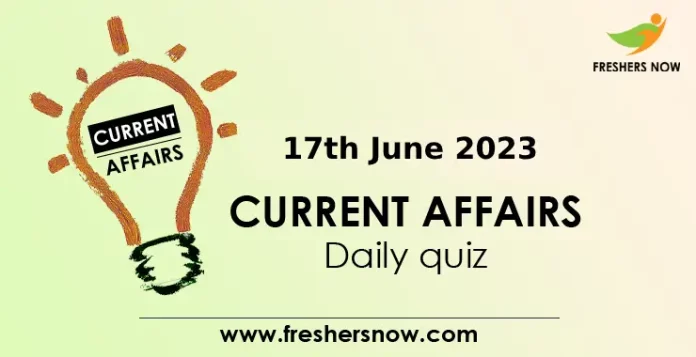
17th June 2023 Current Affairs Quiz – Are you searching for Current Affairs Quiz 17th June 2023? then stay updated with the latest happenings around the world as we test your knowledge on significant events and developments from various fields. From politics and technology to entertainment, this Daily Current Affairs Quiz will challenge your awareness of the most recent news. So, let’s dive into the 17th June 2023 Current Affairs and put your knowledge to the test!
17th June 2023 Current Affairs | Today GK Quiz
1. Which country celebrated the first Father’s Day?
A) United States
B) Canada
C) United Kingdom
D) Australia
Answer: A) United States
Explanation: The first celebration of Father’s Day was held in Spokane, Washington, in the United States in 1910.
2. In which month is Father’s Day celebrated?
A) January
B) May
C) June
D) December
Answer: C) June
Explanation: Father’s Day is celebrated on the third Sunday of June.
3. Which sector witnessed the highest positive growth in May 2023 compared to May 2022?
A) Electronic Goods
B) Other Cereals
C) Oil Meals
D) Spices
Answer: A) Electronic Goods
Explanation: The sector with the highest positive growth in May 2023 compared to May 2022 was Electronic Goods, which showed a growth of 73.96%.
4. What was the overall trade deficit for April-May 2023 compared to the same period in 2022?
A) Increased by 9.63%
B) Decreased by 5.99%
C) Increased by 35.41%
D) Decreased by 7.95%
Answer: D) Decreased by 7.95%
Explanation: The overall trade deficit for April-May 2023 showed a decline of (-) 7.95% compared to the same period in 2022.
5. What are some of the analytical tools used by the Reserve Bank to enhance supervisory frameworks?
A) Risk assessment models and cybersecurity measures
B) Early warning systems and vulnerability assessments
C) Artificial intelligence and machine learning algorithms
D) Privacy concerns and data breach prevention
Answer: B) Early warning systems and vulnerability assessments
Explanation: The Reserve Bank has used various analytical tools, including early warning systems and vulnerability assessments, among others, to enhance the effectiveness of supervisory frameworks.
6. What is the purpose of the College of Supervisors established by the Reserve Bank?
A) To provide training programs for banking supervisors
B) To develop advanced analytics and artificial intelligence
C) To minimize risks and maintain financial stability
D) To handle technological advancements and data breaches
Answer: A) To provide training programs for banking supervisors
Explanation: The Reserve Bank has established a College of Supervisors to provide general and specialised training programs to build supervisors’ skills and capacity.
7. Who founded the Elizabeth Longford Prize for Historical Biography?
A) Ramchandra Guha and Roy Foster
B) Flora Fraser and Peter Soros
C) David Gilmour and Frances Wilson
D) Charles Moore and Julian Jackson
Answer: B) Flora Fraser and Peter Soros
Explanation: The Elizabeth Longford Prize for Historical Biography was founded in 2003 by Flora Fraser and Peter Soros.
8. Which book by Ramchandra Guha won the Elizabeth Longford Prize for Historical Biography 2023?
A) Rebels Against the Raj: Western Fighters for India’s Freedom
B) The Long Recessional: The Imperial Life of Rudyard Kipling
C) How to Survive the Titanic: The Sinking of J. Bruce Ismay
D) Margaret Thatcher: The Authorized Biography, Volume 1: Not for Turning
Answer: A) Rebels Against the Raj: Western Fighters for India’s Freedom
Explanation: Ramchandra Guha’s book Rebels Against the Raj: Western Fighters for India’s Freedom won the Elizabeth Longford Prize for Historical Biography 2023.
9. What are the four pillars of the Government of India – United Nations Sustainable Development Cooperation Framework?
A) People, Prosperity, Planet, and Participation
B) Gender Equality, Youth Empowerment, Human Rights, and Sustainable Development
C) Health and Well-being, Quality Education, Economic Growth, and Environment and Climate
D) South-South Cooperation, Localization of SDGs, Stakeholder Engagement, and India’s Vision for the Future
Answer: A) People, Prosperity, Planet, and Participation
Explanation: The Government of India – United Nations Sustainable Development Cooperation Framework is built upon four pillars: People, Prosperity, Planet, and Participation. These pillars serve as the foundation for advancing India’s sustainable development goals.
10. Who led the formulation of the GoI-UNSDCF and engaged various stakeholders in the process?
A) NITI Aayog
B) United Nations Development System in India
C) Government of India and the United Nations
D) Civil Society, Think Tanks, and Private Sector
Answer: A) NITI Aayog
Explanation: The NITI Aayog, the government policy think tank, led the formulation of the GoI-UNSDCF. They were responsible for engaging line Ministries, State Governments, Union Territories, and other stakeholders such as civil society, think tanks, private sector, cooperatives, and labor unions in the process.
★★ You Can Also Check ★★



